Google Ads management is about control — control over your budget, traffic quality, and exactly how much you pay for every conversion. If you don’t manage it right, your money disappears before your campaign even gets started.
Whether you’re pushing nutra, ecom, leadgen, or info products, what you want are results — not just empty impressions or clicks. Smart Google Ads management means building solid campaign structures, cutting out useless traffic, testing creatives fast, and actively managing your bids and keywords. No optimization means no profit. It’s that simple.
In 2025, the Google ad auction is tougher than ever. If you’re not adjusting bids and keeping an eye on your Quality Score, your ads either won’t show or will cost more than you can afford.
Good management isn’t “set and forget.” It’s daily grind. You check your numbers: which keywords make money, which ones burn it? Where’s your CTR going up or crashing? What landing pages convert and which just waste your traffic? You need to know all this — and act fast.
Google Ads can scale hard — but only if you treat it like a business, not a slot machine. You run the data, test, cut losers, and repeat. Without this mindset, Google Ads will eat you alive.

Alright, so what’s all this about? Enough intro — let’s get down to business.
In this guide, we’re gonna break down — step by step:
- How to launch Google Ads campaigns without burning your stack
- What rookie mistakes nuke your budget from day one
- Why “set it and forget it” is pure fantasy in 2025
- How to set up tracking, tweak your copy, and squeeze every drop of ROI
Let’s not waste time — we’re going in.
Google Ads Management for People Who Care About ROI, Not Vanity Metrics
If the first rule of Google Ads management is control, the second is prioritizing real returns. In 2025, only those who truly understand effective Google Ads management will stay in the game and consistently make money.
Effective Google Ads management isn’t about flashy reports with tons of impressions or clicks. It’s about a precise, efficient, and smart approach that drives profit. Why pay for millions of impressions if your ads aren’t reaching the right people? It’s not about reach — it’s about quality traffic that actually converts.
Adwords management is for those who count money, not likes and clicks. Your goal is to maximize ROI, not chase empty numbers that just create the illusion of activity. Every dollar spent should come back with profit.
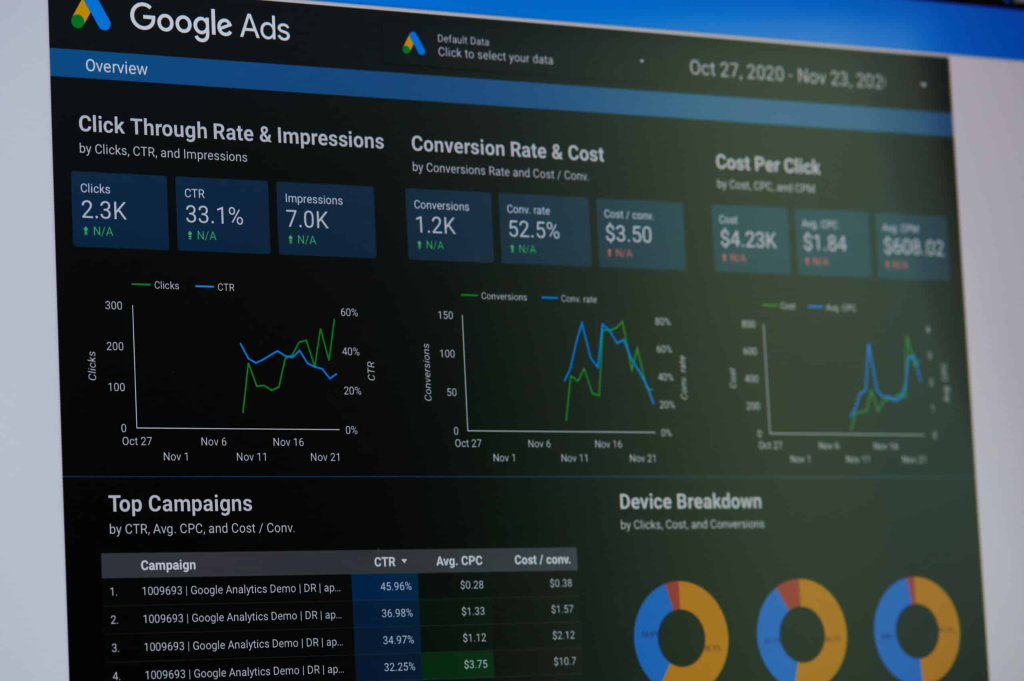
Competition on Google Ads is fiercer than ever, and just launching a campaign isn’t enough. You need to manage bids smartly, carefully select keywords, segment your audience, and constantly optimize your ads. Only then can you lower your cost per conversion and increase profitability.
Forget “set and forget” — that’s a thing of the past. Adwords management demands constant attention and adjustments. If you want to control your performance and see real growth, you need to analyze data daily and make fast decisions.
In the end, effective Google Ads management guarantees your ad budget isn’t wasted but turns into steady income. Don’t waste time and money on useless vanity metrics — manage your campaigns like a pro managing investments.
How to Own Google Ads and Make Your Budget Work Hard
Listen up: Google Adwords campaigns don’t run on autopilot — they need a sharp plan and constant work. Here’s how to do it right, step by step.
1. Set a Clear Goal
Before you launch, ask yourself:
- Do I want leads?
- Do I want sales?
- Do I want email signups or subscriptions?
No clear goal = no results. Google won’t guess your intent. Without this, you’re just burning budget with no direction.
2. Nail Your Keyword Research
Use tools like SEMrush, Ahrefs, or Google Keyword Planner to:
- Find high-intent, buyer-ready keywords
- Avoid generic, competitive terms that kill your budget
- Focus on relevance, not volume
Good keyword research = half the battle won.
3. Structure Your Ad Groups Like a Surgeon
Remember:
- One ad group = one clear theme
- Separate hot leads from cold traffic
- Keep messaging and keywords tightly focused
Mixing traffic types kills CTR and quality scores — and Google will charge you more.
4. Budget & Bidding Strategy
Start with:
- Automated bidding (to gather data safely)
Then:
- Switch to manual bidding to control costs
- Adjust bids by device, location, time of day
Blind bidding = quick budget drain. Smart bidding = squeezing max ROI.
5. Manage Like a Pro — Daily
Adwords campaign management isn’t “set and forget.” It’s:
- Analyzing daily performance
- Killing dead keywords and ads
- Testing new creatives and copy
- Optimizing bids continuously
Metrics That Matter
Forget vanity metrics. Track:
| Metric | Why It Matters |
| Cost per Acquisition (CPA) | Shows real cost to get a customer |
| Return on Ad Spend (ROAS) | How much revenue you get for each $1 spent |
| Customer Lifetime Value (CLV) | Long-term profit from each customer |
If you want to dominate with Google Adwords campaigns, you need clear goals, sharp keyword work, surgical ad groups, smart bidding, and relentless daily management. Play soft, lose cash. Play hard, own the game.
Best Practices for Managing Google Ads Campaigns
Let’s be clear: managing Google Ads isn’t about launching and hoping for the best. It’s about daily moves that keep your budget tight and your conversions climbing. Want profit? Then follow the 3 golden rules.
1. Monitor Every 24–48 Hours
No exceptions. Managing Google Ads means keeping your eyes on the data — all the time.
- CTR dropped? Cut the ad.
- Got a keyword pulling conversions? Raise the bid.
- Wasted spend creeping in? Pause it immediately.
Lazy monitoring = dead campaigns. This is not a weekly task — it’s your daily routine if you want real ROI.

2. Ad Copy Optimization: Always Be Testing
Run A/B tests like it’s your religion.
- Minimum 3–4 ad variations per ad group.
- Test different hooks, CTAs, offers, angles.
- Kill the underperformers fast.
Your ad copy is your pitch — if it’s weak, no clicks, no leads, no cash. Keep it sharp.

3. Use Ad Extensions — All of Them
Ad extensions can boost CTR by up to 30% — for free.
- Use callouts to highlight key benefits
- Add sitelinks for extra clickable areas
- Throw in snippets to add relevance and depth
If you’re not using extensions, you’re leaving money on the table.
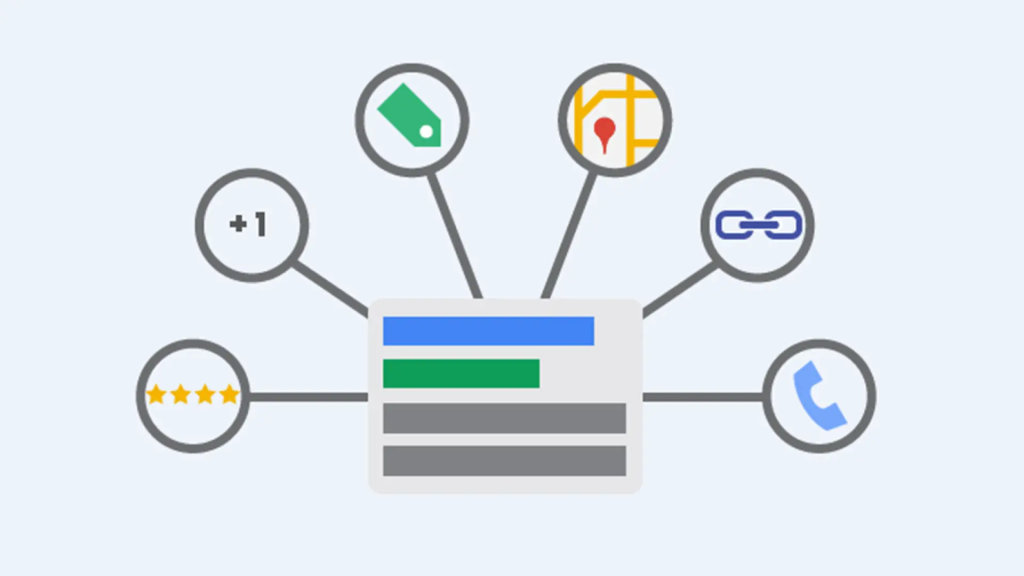
Bonus: Chase the Quality Score
Google rewards relevance. Improve:
- Landing page speed and content
- Ad relevance to keywords
- Historical CTR
Higher Quality Score = lower CPC and better placement.
Google Ads Campaign: Problem → Solution
Problem: CTR is dropping across key ad groups.
Solution:
- Pause low-performing ads immediately
- Test new copy variations (3–4 per group)
- Use stronger CTAs and more specific benefits
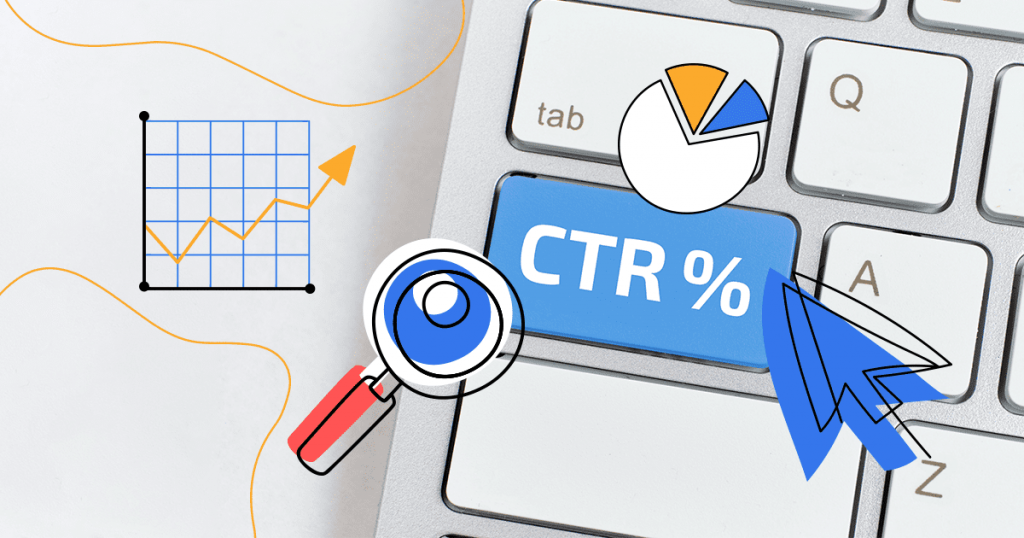
Problem: Budget is draining fast with low ROI.
Solution:
- Audit search terms and placements daily
- Kill off irrelevant or broad-match keywords
- Start with automated bidding → switch to manual on proven performers

Problem: Ad impressions are fine, but no conversions.
Solution:
- Align landing page messaging with ad copy
- Improve page load speed and mobile UX
- Exclude cold or irrelevant traffic sources

Problem: Ads are showing, but CTR is too low.
Solution:
- Rewrite headlines with urgency, numbers, and real offers
- Add ad extensions: callouts, sitelinks, snippets
- Break out ad groups by user intent

Problem: High CPCs eat up your profit margin.
Solution:
- Boost Quality Score with better relevance across the funnel
- Improve CTR through better copy testing
- Use negative keywords to eliminate waste

Problem: You don’t know what’s working and what’s killing your spend.
Solution:
- Check performance every 24–48 hours
- Track real KPIs: CPA, ROAS, CLV — not just clicks
- Set up conversion tracking and pixel data properly
Google Ads campaign management without these moves? You’re not running ads — you’re donating to Google. Run it tight or don’t run it at all.
Common Mistakes in Google Ads Management (and How to Avoid Them)
Let’s get one thing straight: Google adword management is not beginner-friendly. The system is powerful, but it punishes carelessness. Here are the most common mistakes that drain budgets fast — and how to avoid them like a pro.
No Negative Keywords = Paying for Garbage
If you don’t use negative keywords, you’re buying useless clicks. Traffic that doesn’t convert = money down the drain.
How to avoid it:
- Start with a base negative keyword list (tons available online for free)
- Review your search terms every 2–3 days
- Add new negatives regularly to tighten targeting
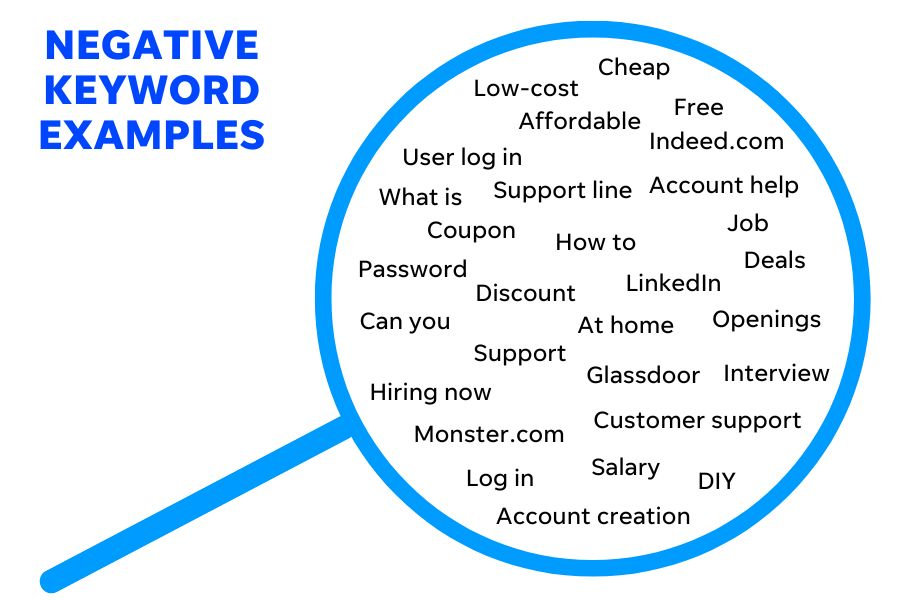
Ignoring Mobile = Losing Half Your Traffic
Most of your traffic comes from mobile devices. If your landing page loads slow, buttons are too small, or the layout’s broken — users bounce, and conversions die.
How to avoid it:
- Always test your creatives and landing pages on mobile
- Make sure the page loads fast and is easy to navigate
- Adjust bids based on device performance and time of day

Set-and-Forget = Pure Fantasy
This is one of the biggest lies in advertising. You don’t “set it and forget it.” You watch it, test it, and fix it — constantly. Ads decay fast. No management = no profit.
How to avoid it:
- Check your campaigns every 24–48 hours
- Track performance: CTR, keywords, conversion rate
- Kill what’s losing money, scale what’s converting

Pro tip: Smart adword campaign management is 50% automation, 50% hands-on control. That’s the only way to run campaigns that don’t just run — they make you money.
Optimizing Ad Copy and Landing Pages for Better Performance
Let’s be real — even with perfect targeting, your campaign dies fast if your ad copy sucks or your landing page looks like it was built in 2009. A real Adwords campaign manager knows: every click costs money — so every word better work.

Craft Headlines That Sell, Not Just Describe
Boring = ignored. Strong headlines grab attention and scream value.
- “Get 20% Off First Order” beats “Welcome to Our Store” every time
- Use urgency, numbers, clear offers, and benefits
- Think like a user scrolling fast — why should they stop?
Always Be Testing — A/B Is Mandatory
You’re not guessing here — you’re testing.
- Run multiple ad variations per group (at least 3)
- Test CTAs: “Start Free” vs. “Get Instant Access”
- Swap emotional hooks, feature mentions, and benefit-first lines
- Kill losers early — scale what wins
No A/B testing = you’re flying blind. That’s how budgets disappear.
Landing Pages Need to Match and Convert
A click is worthless if your landing page doesn’t deliver.
- The offer in the ad must match the headline on the page
- Keep messaging consistent — no bait-and-switch
- Make the page fast, mobile-optimized, and laser-focused on one goal
- Strip out distractions, simplify your funnel

Google rewards relevance — and users reward clarity. If your LP doesn’t load fast or if the CTA is buried, you’re bleeding conversions.
Remember: even the best Google adwords campaigns can’t perform if the backend experience is broken. It’s like driving a Ferrari with no fuel. You need copy that converts and pages that close.
The Role of Keyword Research in Google Ads
Let’s get straight to it: no matter how good your ads look, if your keywords suck — you’re wasting money. Google adwords management starts with precision keyword research. Do it right, and your CTR jumps by 30% easy. Do it wrong, and you’re just showing up in the wrong searches and paying for junk clicks.

Here’s how real pros handle it:
High-Intent Keywords = Buyers Only
Don’t target people just “browsing” — target buyers.
Look for keywords with strong intent signals, like:
- “buy,” “order,” “fast shipping,” “get quote,” “book now”
- Branded terms with modifiers (“Nike running shoes discount”)
- Local + action-based search queries (“plumber near me,” “lawyer free consult”)
These are people ready to act. That’s who you want.
Long-Tail Keywords = Lower CPC, Higher Quality
Forget broad matches that get you trash traffic.
Target long-tail keywords that are:
- More specific
- Less competitive
- Cheaper per click
- More likely to convert
Example: Instead of “CRM software,” try “free CRM software for small business.”
Negative Keywords = No Budget Burn
Not excluding bad queries? Say goodbye to ROI.
Regularly add negative keywords to filter out irrelevant traffic:
- “free,” “jobs,” “how to,” etc., if you’re selling something
- Constantly monitor search terms and clean out noise
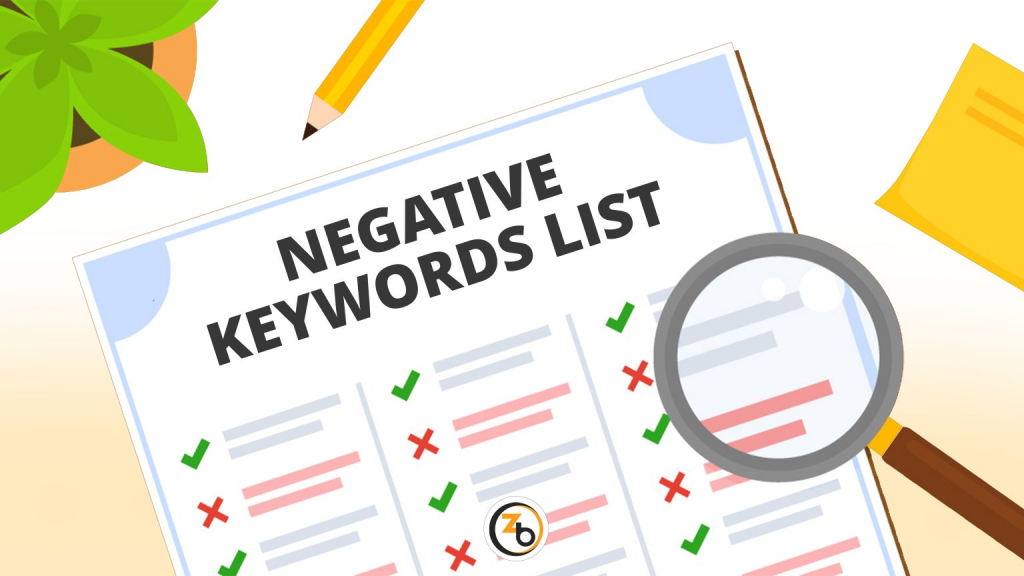
Bottom line: Solid keyword research is the core of adwords management. It’s not just a setup task — it’s an ongoing process. Audit. Add. Trim. Repeat.
Without it, you’re not running ads — you’re just throwing darts blindfolded.
Tracking and Measuring the Success of Your Google Ads Campaigns
Let’s be honest — if you don’t track your numbers, you’re not running ads. You’re just donating money to Google. Proper tracking is the foundation of real Google ads campaign management, and without it, every decision you make is a gamble.
Step 1: Set Up Conversion Tracking (No Excuses)
Before you even launch, you need to define what a “conversion” is. Sales? Leads? App installs? Calls?
Then:
- Install your tracking pixels correctly (use Google Tag Manager or native tags)
- Test them. Twice.
- Set up micro-conversions too — newsletter signups, button clicks, page scrolls — for a full-funnel picture
If you don’t know what happens after a click, the whole campaign is guesswork.
Step 2: Measure What Actually Matters
Forget vanity metrics. Here’s what you track daily:
- CTR (Click-Through Rate): Are people even noticing your ads?
- CPC (Cost Per Click): Are you overpaying for attention?
- CPA (Cost Per Acquisition): How much does it cost to get a real result?
- Conversion Rate: Are clicks turning into cash or leads?
- Session Behavior: Use Google Analytics to check bounce rate, time on site, funnel drop-off
Step 3: Real Adwords Campaign Management = Data Discipline
You don’t just check once a week. You monitor every 24–48 hours. Why? Because campaigns change fast.
- One keyword goes hot, another tanks
- A landing page breaks
- A bid strategy starts burning through your budget overnight
Without constant analysis, adwords campaign management turns into blindfolded spending. Top media buyers don’t guess. They test, track, and tweak non-stop.
In short? You can’t scale what you can’t measure.
Advanced Strategies for Google Ads Management
So, your campaigns are live. Tracking’s in place. CTR and CPA look decent. Cool — now what? Time to scale. Time for advanced moves.
Because in 2025, Managing Google adwords isn’t just about keywords and bids — it’s about managing audiences. Here’s how real pros move.
Remarketing: Cheapest Way to Win Warm Traffic
People who clicked but didn’t convert? They’re your hottest leads.
- Run custom campaigns targeting users who visited product pages, cart, or bounced at checkout
- Use aggressive offers or urgency-based CTAs (“Still thinking? 10% off today only”)
- Layer with frequency caps to avoid annoying your list
This is low-CPC, high-ROAS territory. And it scales.
Segment Your Audiences Like a Sniper
Blanket messaging is dead. Start tailoring.
- Segment by behavior: past converters vs. new visitors
- Segment by demographics: age, location, device, interests
- Create ad variations that speak directly to that segment’s intent
Example: New traffic sees “Free Trial.” Returning traffic sees “Welcome Back — Here’s 20% Off.”
Personalized = profitable.
Use the Display Network for Smart Reach
Yes, Display can be garbage if you run it blind.
Used right, it’s a beast for awareness, retargeting, and cheap conversions.
- Target placements manually (industry blogs, niche news, etc.)
- Combine with custom intent audiences for precision
- Works insanely well for e-comm, lead gen, affiliate pushes
Bottom line: google adword management at a high level means understanding behavior, not just search queries. You’re not running ads — you’re building funnels with sniper-level targeting.
Ready to play big? Then start thinking beyond the keyword box.
How to Manage Budgets and Bids Effectively in Google Ads
Even the best targeting and creatives won’t save you if your bidding is off. A skilled Adwords campaign manager knows it’s not about spending more — it’s about spending smart.
Budget Allocation: Spend Where It Works
Not every campaign deserves equal budget.
- High ROAS campaigns? Feed them.
- Underperformers? Cut or fix before scaling.
- New tests? Start small and scale up only if they prove profitable.
Use portfolio strategies if managing multiple campaigns. And never “set and forget” budgets — they need regular rebalancing based on actual performance.
Bid Smart: More Doesn’t Always Mean Better
Overbidding doesn’t guarantee traffic — it just kills profit.
Base your bids on ROAS, not gut feelings or CTR.
- For high-converting keywords, raise bids with caution
- For broad terms, start low — filter before you scale
- Segment bids by device, location, time-of-day for better control
Auto Bidding: Good, Not Perfect
Smart Bidding works — in many cases.
- Target CPA and ROAS strategies can deliver great results
- But: they need enough data to work well
- Test before trusting, and don’t go full-auto across the board
Sometimes manual gives tighter control — especially for experienced buyers who know their numbers.
Watch the Spend Like a Hawk
Weekly spend checks aren’t optional.
- Look for spikes
- Look for creeping CPC
- Make sure profit still beats spend
Even a well-optimized google adwords campaign can nosedive if budget control slips.
Rule of thumb? Control the bids — control the outcome. You’re not just paying for clicks. You’re paying for margin.
The Importance of A/B Testing in Google Ads Campaigns
Let’s be clear: if you’re not testing, you’re just guessing. And guessing = burning budget. Real Adwords management means letting the data decide what works — not your ego.
A/B testing isn’t optional — it’s your edge. Your campaigns don’t win by chance. They win because you test ruthlessly and cut what’s weak.

What to Test in Your Ads
Don’t run just one version and pray. Test everything that touches the user:
- Headlines: Try urgency vs. curiosity (“Limited Offer” vs. “You’re Missing This”)
- Descriptions: Test benefit-led vs. feature-focused copy
- CTAs: “Buy Now” vs. “Try Free Today” — small words, big impact
- Display URL: Even cosmetic changes affect CTR
One small tweak can swing your ROI hard in either direction. Never assume — test.
Landing Page Experiments
Sending clicks to a bad page is the fastest way to burn cash.
Here’s what to A/B on landing pages:
- Button color and placement
- Form length
- Above-the-fold copy
- Hero image vs. video
- Trust badges, testimonials, timers
Keep one variable per test. No chaos. You want clean data, not guesswork.
Data Wins, Opinions Don’t
The beauty of google ads management is that it’s not emotional.
The ad that converts wins. Period. No debate.
Run tests for 7–14 days minimum (or to statistical significance), then double down on the winners.
Our benchmark: consistent A/B testing = +15–20% conversion rate monthly. No fluff, just facts.
Test. Kill. Scale. Repeat.
Utilizing Ad Extensions to Improve Ad Performance
Let’s not sugarcoat it: running Google ad management without extensions is like launching a sales page with no “Buy” button. You’re just wasting real estate.
Ad extensions are free upgrades to your ad. They don’t cost extra per click, but they boost visibility, give users more reasons to click, and improve your CTR instantly. And yes — Google favors ads with them.
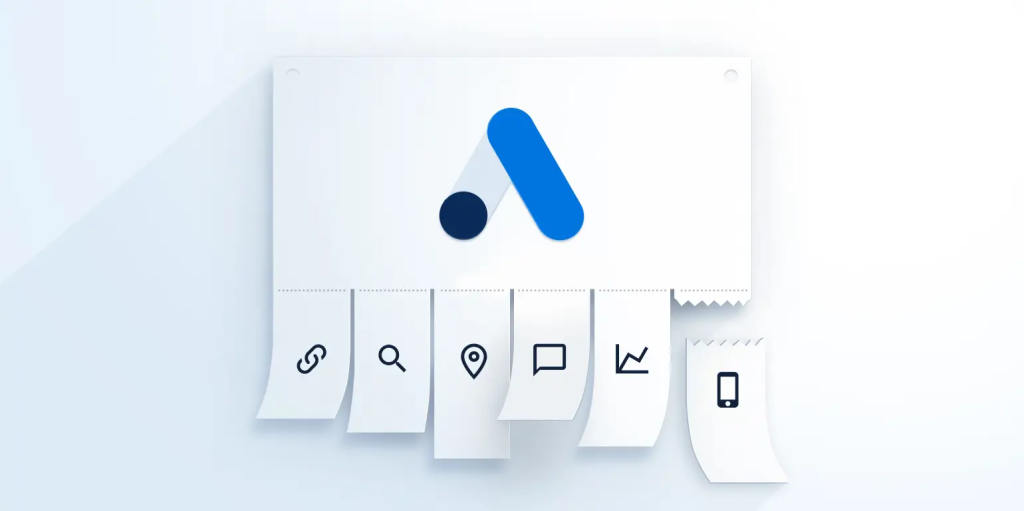
Types of Extensions You Should Be Using
Sitelinks
Give users more clickable paths. Push them to your top-selling pages, FAQs, contact forms, or promo categories.
Callouts
Short, punchy value props like “Free Shipping” or “24/7 Support.” Think feature bullets — right in the ad.
Structured Snippets
Show categories, product types, or service offerings. Works great for e-comm and SaaS.
Image Extensions
Highly underrated. These add visuals to your text ads — and grab eyeballs fast. Especially powerful for fashion, travel, food, or anything visual.
Call Extensions / Location Extensions
Perfect for leadgen or local — let people call or find you directly from the ad.
Why They Matter
- Increased CTR (up to 30% in many cases)
- More qualified clicks (users get more info up front)
- Higher Quality Score (Google loves full-featured ads)
- Better UX — because the ad delivers more, right away
Best Practices
- Match extensions to your ad’s message
- Keep sitelinks and callouts relevant to the keywords
- Use unique text — no repetition
- Monitor performance and rotate underperforming extensions
Bottom line? Smart ad words management always includes extensions. No extensions = missed traffic and lost conversions. Don’t leave money on the table.
Understanding and Improving Quality Score in Google Ads
Let’s get this straight: your Quality Score is the silent killer or secret weapon behind every Google Ads auction. It decides where your ad shows and how much you pay for each click.
If your Google ads management game is weak, your QS tanks — and Google makes you pay premium just to play.

What Makes Up Quality Score?
Google grades every keyword in your account from 1 to 10. The higher, the better. What affects that score?
- Expected CTR: Based on your ad history and how likely people are to click
- Ad Relevance: How well your ad copy matches the keyword
- Landing Page Experience: Is your page fast, useful, and mobile-friendly?
You can’t fake this. Google watches how users behave — and scores accordingly.
Why It Matters
- High QS = Lower CPC: You pay less for better placements
- Low QS = Budget Burn: Your ads show less, cost more, and get crushed by better-optimized competitors
- QS Impacts ROAS: Better score = better ad rank for the same or lower cost
How to Fix It (Fast)
- Tighten Keyword Groups: One intent per ad group. No mixing.
- Upgrade Your Ad Copy: Speak directly to the keyword. Use dynamic insertion when it fits.
- Polish the Landing Page: Fast load, clear CTA, no fluff. Keep it mobile-first and focused.
- Monitor Bounce Rate: High bounce = low QS. Use scroll maps, heatmaps, and GA4 events to see what’s wrong.
Bottom line? Adwords management isn’t just about traffic. It’s about making Google love your ads — so they cost less and convert harder.
Leveraging Remarketing Strategies in Google Ads
Most advertisers focus all their effort on finding new users — but the real profit? It often comes from getting back the ones who already know you.
That’s where remarketing comes in. And if you’re serious about Google adwords management, you better be using it.
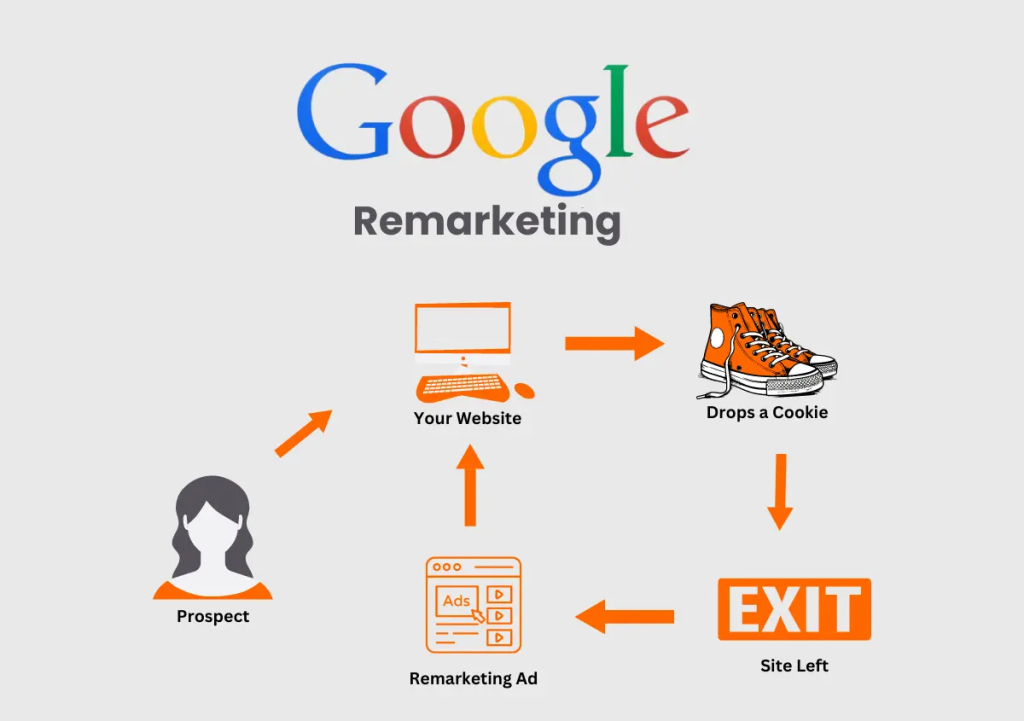
What Is Remarketing?
Simple: it’s targeting people who’ve already interacted with your brand — clicked your ad, viewed a product, or even abandoned checkout. These users are warmer, closer to conversion, and much cheaper to re-engage than cold traffic.
Setting Up Remarketing Campaigns
You’ll need:
- Google Ads Tag or GA4 audiences properly installed
- Segmented lists:
- Cart abandoners
- Product viewers
- Past buyers
- Email/CRM uploads for loyalty remarketing
- Tailored creatives for each list. Don’t show the same ad to someone who already bought. Speak to their context.
Want to go next level? Use dynamic remarketing — especially in e-commerce. Show users the exact products they looked at. This alone can increase ROAS by 2–3x.
Best Practices
- Frequency capping: Don’t annoy — 3–5 impressions per user/day is enough
- Custom messaging: Cart abandoners get urgency. Past buyers get upsells or cross-sells
- Segmentation is everything: Treat leads, buyers, and lurkers differently
- Exclude converters: Don’t waste spend retargeting those who already converted
Bottom line: adwords campaign management isn’t just about finding new eyes. It’s about not wasting the warm ones you already paid for. Remarketing is ROI fuel — use it smart.
The Benefits of Hiring a Professional for Google Ads Management
Let’s be blunt — running your own ads without knowing what you’re doing? That’s how budgets burn fast and results crawl. If you want serious ROI, hiring a pro isn’t a luxury — it’s the move.

1. Real Expertise = Real Profit
A professional knows the Google Ads ecosystem inside out.
- They’ve seen what works and what tanks.
- They bring proven campaign structures, killer ad copy strategies, and audience targeting that’s razor-sharp.
- They know how to read data, not just stare at it.
While you’re guessing, they’re optimizing in real time.
2. Time Back = Focus on Growth
Delegating Google ads management means you’re not the one:
- Writing endless ad variations
- Checking CTRs at 1 a.m.
- Trying to decode Google’s bidding logic
You focus on business. They handle the ad engine. Time is money — and this is how you buy more of it.
3. Tools, Scripts, Automations
Good pros don’t rely on default dashboards. They use:
- Scripts to pause bad keywords in real time
- Automation to manage bids and budgets efficiently
- APIs to analyze at scale
- Insider tools (SEMrush, SpyFu, custom-built dashboards)
This isn’t DIY — this is adwords management at a surgical level.
Results Speak
In our experience? A solid PPC specialist pays for themselves 3x faster than self-managed campaigns. Better CTR, better ROAS, fewer wasted clicks. It’s not theory — it’s math.
Bottom line: You’re either paying for expertise or for mistakes. The smart money? Always hires the right partner.
Take Control and Boost Your Profits Today
You’ve just walked through the full spectrum of google ad management — from the basics to the advanced tactics that separate winners from the rest. Every step you’ve learned, every strategy uncovered, is a powerful tool to take control of your campaigns and transform ad spend into real profit.
Remember, google campaign management isn’t a one-time task or a “set and forget” game. It’s a continuous process that demands your attention, your insight, and your willingness to adapt. When done right, google ads managment becomes a business multiplier — delivering quality traffic, boosting conversions, and maximizing ROI.
Don’t get caught chasing vanity metrics or throwing money at campaigns without a clear plan. Focus on what truly matters: targeted keywords, smart bidding, compelling ad copy, and data-driven optimization. Keep testing, keep refining, and never stop learning how to manage Google Ads effectively.
If you feel overwhelmed, know this: even the best can get help. Hiring a pro for ad words management can skyrocket your results and save you time, letting you focus on growing your business.
This ultimate guide to Google Adwords and ultimate guide to Google Ads equips you with the tools to manage Adwords like a pro. The power to succeed in google ad management is in your hands. Use these insights, commit to the grind, and watch your campaigns evolve from cost centers to profit engines.
Now is your moment — take control, stay sharp, and make every dollar count. Your success story starts here with expert google campaign management and smart strategies on how to manage Google Ads.


0 Comments